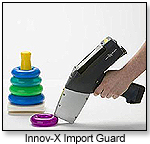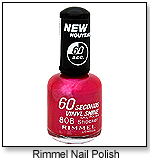
April 10, 2025


| “I think customers have come to expect us to research the toys, and take care of them — that’s our job.” — Kate Tanner, Kidstop |
 Last year’s recalls increased consumer awareness and concern about health risks associated with kids’ toys. Concurrently, California passed AB1108 — also known as the California Toxic Toys Bill — in October, making the state the first to ban the use of phthalates in children’s toys.
Last year’s recalls increased consumer awareness and concern about health risks associated with kids’ toys. Concurrently, California passed AB1108 — also known as the California Toxic Toys Bill — in October, making the state the first to ban the use of phthalates in children’s toys.  Phthalates are oil-like chemicals used to make plastics softer and more flexible. Toys are just one of many products that can contain them. According to a 2000 National Institute of Environmental Health Sciences review, detergents, cosmetics (such as nail polish) and wood finishes are sources of human exposure to phthalates.
Phthalates are oil-like chemicals used to make plastics softer and more flexible. Toys are just one of many products that can contain them. According to a 2000 National Institute of Environmental Health Sciences review, detergents, cosmetics (such as nail polish) and wood finishes are sources of human exposure to phthalates. |
VARIOUS CHEMICALS MAY POSE RISKS
The Ecology Center in Michigan has established HealthyToys.org, which conducts and reports ongoing tests of children’s products. Using Innov-X Systems’ X-Ray Fluorescent Import Guard, they test for lead as well as mercury, chromium, bromine, arsenic and cadmium.“Less than 5 percent of toys tested contain lead. But nearly a third contained PVCs, which are more likely to have chemical additives that are associated with different health concerns,” said Research Director Jeff Gearhart. “Oftentimes, the presence of PVC indicates the need for further testing,” explained Andrea Klos, business development specialist at Innov-X, noting that the Import Guard doesn’t test for phthalates but does detect PVC. Frank W. Clarke, consultant to the Toy Industry Association, told TDmonthly that “all of these substances are covered by the Federal Hazardous Substances Act (FHSA), and their regulation in consumer products is under the jurisdiction of the CPSC. The TIA certainly would not want children to be exposed to any dangerous level of these chemicals. We believe there is little, if any, available incidence of these chemicals in toys and that parents should not be concerned about them.” |
|
PARENTAL CONCERN DECLINES
At the height of the 2007 toy recalls, Kathy Jenkins of Toys in the Attic in Dalton, Ga., arranged to have a testing company come to her store for an entire day, and invited people to bring their toys to be tested for lead at no charge. Despite heavy coverage by TV, radio and print, only 16 people showed up.“Consumer response was pathetic. We were expecting it to be very busy. It was like they (parents) were worried, but not actually enough to make the effort.” David Campbell, owner of Amazing Toys in Great Falls, Mont., said he’s not heard any concern from customers about phthalates or other chemicals since last year’s lead scare. “There’s still a certain amount of concern by grandparents about toys made in China, although not from parents. I assure them that everyone has gone back and retested toys (for lead), and that toys are safe in that regard.” Conversely, Jeremy Weir of Exposing Lead, based in Roswell, Ga., felt that awareness is “definitely up.” He uses the Import Guard to conduct in-home and daycare-center tests. “Families with special needs kids are the ones that are really taking action about it, and their awareness was high before the toy recalls. Many special needs kids, especially those who are autistic, don’t rid themselves of heavy metals the way our bodies do, and they are constantly going through chelation therapy [to remove the metals],” he said. |
 “I think customers have come to expect us to research the toys, and take care of them — that’s our job. We have a binder of letters from manufacturers, educating our customers on what labels to look for and testing being done. … It is children’s safety we are after, and not the bottom line.”
“I think customers have come to expect us to research the toys, and take care of them — that’s our job. We have a binder of letters from manufacturers, educating our customers on what labels to look for and testing being done. … It is children’s safety we are after, and not the bottom line.”
Copyright © 2025 TDmonthly®, a division of TOYDIRECTORY.com®,
Inc.